Best Multivitamin for Kids of 2021
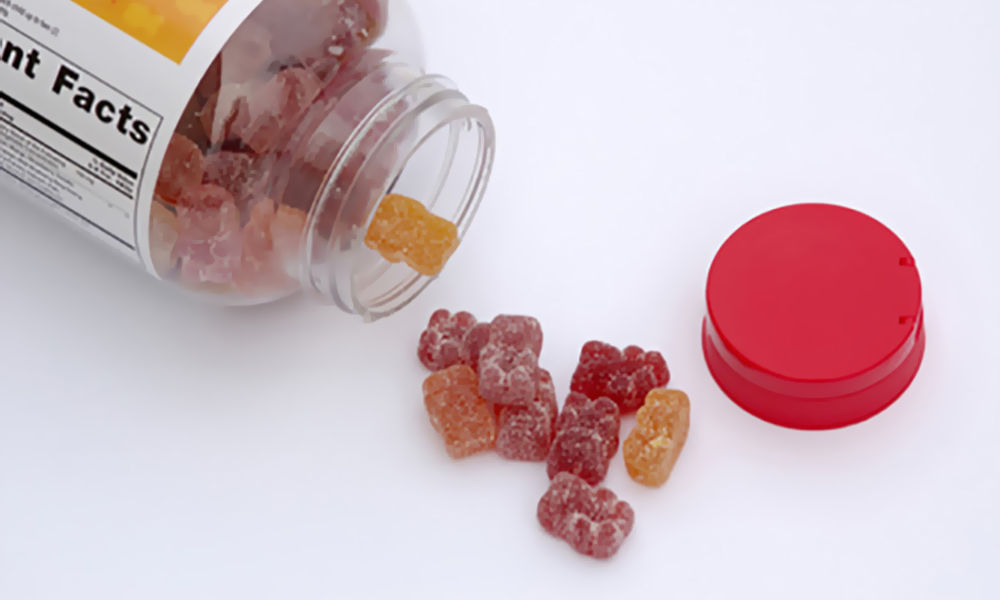
Kids have very specific dietary needs that aren’t always met by what they eat. The solution to that problem is to give them kids’ multivitamins. These vitamins are formulated to address the unique nutritional challenges kids face as their bodies go through periods of rapid growth.
That includes the need to build a strong, flexible skeletal system and to ensure they’re producing enough healthy red blood cells to meet the demands of their expanding musculature. We’ve looked at dozens of different multivitamins for kids and narrowed the field down to 10. We think you’ll agree these are the best multivitamins for kids currently on the market.
1. Garden of Life Vitamin Code for Kids
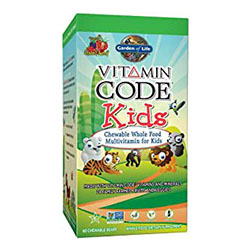
Garden of Life produces a full line of high quality vitamin and mineral supplements for adults. So it’s no surprise that their Vitamin Code for Kids would be as highly regarded as it is. Vitamin Code is one of the company’s signature adult vitamin supplements. Here they’ve tweaked it to bring it in line with the nutritional needs of kids.
That means plenty of vitamins A, D and B12, as well as probiotics to promote a healthy digestive system. All vitamins and minerals here are gleaned from fruits and vegetables. There are no GMOs, no artificial colors or additives. No stabilizers. No gluten, soy, dairy or other potential food allergens. Vitamin Code for kids is presented in chewable gummy form and features natural cherry flavor.
2. Tropical Oasis Premium Kids Multivitamin
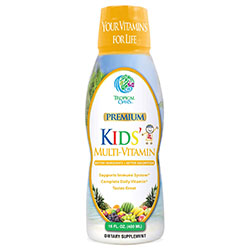
Tropical Oasis Premium Multivitamins provide a range of important vitamins and minerals in liquid form which completely bypasses any issues around swallowing capsules. Research indicates that liquid supplements and medications are always absorbed quicker by the body. In addition, liquid supplements are utilized to a greater extent by the body (1).
Enabling the vitamins and minerals to do a more effective job. Tropical Oasis does not burden kids with GMOs, sugar, gluten or food allergens. All it does is provide 14 vitamins and minerals every kid needs to develop strong bones, muscles and teeth. The taste here is pleasant enough and kids are unlikely to reject it. Just one tablespoon per day on a full stomach will set them right.
3. Flintstones Gummies Complete
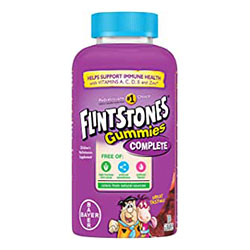
Flintstones was one of the first widely available children’s multivitamins when it hit stores more than 40 years ago. Today, it’s still one of the most trusted brands of children’s multis there is. Their Gummies Complete cover pretty much the entire nutrient spectrum and deliver their important cargo by way of a pleasant tasting chewable.
Kids under 2 – 4 years of age are advised to take 1/2 a gummy per day. While kids older than 4 should take one full gummy daily. The downside here is that, while they contain no artificial sweeteners they do contain small amounts of sugar. Which helps explain why most kids like them so much. Beyond that though there are no GMOs or common food allergens and no artificial preservatives.
4. MegaFood Kids One Daily
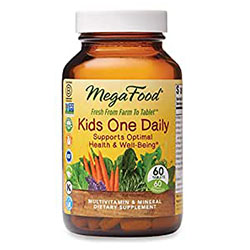
MegaFood Kids One Daily is provided in tablet form which most manufacturers avoid for kids. In this case though the tablet size is very modest and easy to swallow. They’re ideal for kids 4 and over who have no issues swallowing capsules or tablets. They contain all the usual vitamin suspects as well as a complement of not often seen but still important minerals such as copper and selenium.
There are 24 vitamins and minerals in all, making it one of the most comprehensive kids’ supplements on the market. In addition, Kids One Daily contains phytonutrients that help boost levels of beneficial antioxidants. Can be taken at any time of day with food or on an empty stomach.
5. SmartyPants Kids Formula Daily Gummy
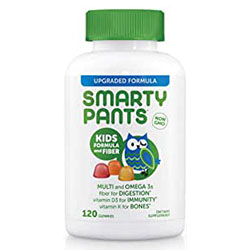
SmartyPants Kids Formula is designed to provide children with the essential vitamins and minerals they need. While at the same time protecting them from genetically modified organisms (GMOs), dairy, gluten, tree nuts, soy and other potential food allergens they don’t need. SmartyPants are recommended for kids 4 years old and up and take the form of chewable gummies that are easy for kids to swallow.
Like several other multis on our list this one is iron-free, which some parents will appreciate. However, if you’re concerned you’re concerned your youngster may be suffering from anemia you’ll want to try an iron-inclusive multi. Aside from that these are high potency, high quality multis that should provide for most kids’ nutritional needs.
6. Naturelo Chewable Multivitamin for Children
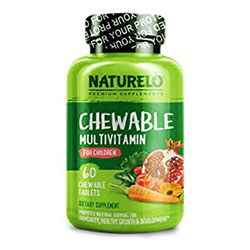
Not to be outdone by MegaFood, Naturelo provides 37 vitamins and minerals in their Multivitamin for Children. These are high potency multis that are more appropriate for kids 5 and over than they are for toddlers. The tastes is not exactly appealing either. Meaning they’re not going to go over well with fussy eaters.
That’s the one reason they wound up down here at the 6 position rather than in our 1 or 2 position. Still, if your child can get past the curious taste they’ll benefit from the array of important nutrients including vitamins A, B12 and D. And the minerals calcium, selenium and zinc among others. There are also numerous phytonutrients derived from various vegetables and fruits that work to bolster antioxidant levels (2).
7. Garden of Life My Kind Kids Gummies
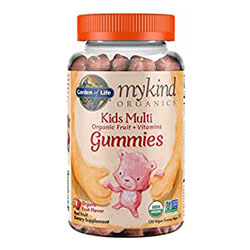
Garden of Life makes a return visit to our best kids multivitamin list with their outstanding My Kind Kids Gummies. These are packed with 17 vitamins and minerals as well as a comprehensive list of phytonutrients gleaned from fruits and veggies. Each gummy derives its taste from 9 organic fruit flavors. And there are no food allergens, no corn starch, no gluten and no GMOs.
In addition, no pig gelatin is used in their fabrication and each capsule is certified vegan and Kosher. These are a good idea for kids who resist capsules and tablets. And a good choice for parents who don’t want to load their kids up with potentially harmful artificial additives.
8. OLLY Kids Multi + Omega 3 Gummies
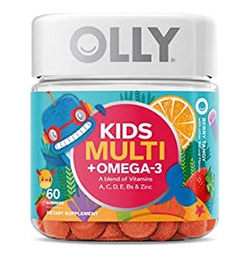
Olly Kids Multi + Omega Gummies are fairly unique in that they not only provide a dozen essential vitamins and minerals. They also provide important omega 3 fatty acids. Omega 3 fatty acids are particularly beneficial in bolstering eye and brain health and in providing enhanced energy levels (3).
There is no gluten or other common food allergens here. No genetically modified organisms and no artificial sweeteners of any kind. Their is however some sugar. Not much. Just enough to make the gummies palatable to kids. But a bit of sugar nonetheless. We’ll bite the bullet on the tiny dose of sugar to get the omega 3s.
9. Nordic Naturals Multivitamin Treats
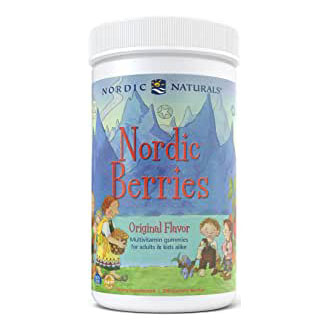
Nordic Naturals are probably best known for their high quality fish oil supplements. But here they are with an outstanding kids’ multivitamin product. Their Treats are packed with essential vitamins and minerals including vitamins A, B, C, D and E along with calcium, magnesium and zinc.
There are no artificial ingredients, no GMOs, no common food allergens like dairy, gluten, wheat or soy. Like the Olly multi we just profiled, however, you will find a modest amount of sugar here to improve flavor. Though it is not refined sugar like you’ll find at the diner. That said, they’re easy to chew and swallow and loaded with beneficial nutrients.
10. NaturesPlus Animal Parade Chewable Multivitamin
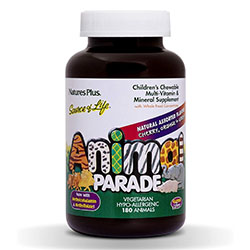
The last of our best multivitamins for kids come to us from NaturesPlus. Their Animal Parade Chewable features 20 vitamins and minerals. Including vitamins A, B, C, D and E as well as potassium, copper, zinc and magnesium. They’re tasty and easy to chew and very affordable to boot.
This is one of the few kids multis that contains iron. Which gives it a leg up in our book. It also provides a healthy serving of fruit based phytonutrients to enhance antioxidant activity. Lastly there’s 2 grams of sugar. Which is an incidental amount, but needs to be mentioned for those averse to any sugar content.
FAQs
Why Give Your Kids Multivitamins?
Kids are little balls of energy brimming with sensory receptors wanting to experience the world. As such they aren’t typically anxious to eat healthy but bland foods. They want flavor. That typically means the immediate gratification of sweets and fatty, MSG-laden junk foods. Your job as a parent is to provide them with the healthy foods they need and to supplement to make up for any nutritional shortfalls. That’s were multivitamins for kids come in.
Some parents question why they can’t just give their child the same multivitamin they use. The answer is that you can, but it simply won’t be as effective. There’s a difference between building a body and maintaining one. Just as there’s a difference between building a house and maintaining one. Developing bodies have specific nutritional requirements that no longer apply once a person reaches physical maturity.
But aside from that, research shows that most people don’t meet the recommended intake of various foods at any stage of life (4). So supplementation is a great way to offset this problem, even in kids. Another factor arguing against using adult vitamins on kids is that kids often have a hard time swallowing the larger, often rock hard multis developed for adult consumption. They’re much more comfortable with gummies. So if you want their multivitamin supplements to be effective it’s best to present them with something they’ll actually take.
Supplementation is not something that should cease as a child hits adolescence either (5). At that point they can experience incredible growth spurts while at the same time undergoing hormonal changes as well as mental and emotional challenges. For all those reasons and more it’s important that they are provided with optimal nutrition at every phase of development, not just early childhood.
What Benefits do Multivitamins Provide Kids?
Multivitamins provide children with an array of benefits that will pay both short and long-term dividends. Those benefits include:
- Covering all the nutritional bases – Multivitamin and mineral supplements cover the full spectrum of nutritional needs in children. Rather than focusing on one particular aspect of childhood nutrition they allow parents the peace of mind of knowing no dietary needs have been left unattended. As we mentioned above the nutritional needs of children are different than the nutritional needs of adults. Kids are always on the move, growing and changing at an incredible rate. While adults tend to become sedentary and stop growing, except around their midsections. So trying to retrofit adult vitamins onto a kid’s nutritional needs simply isn’t going to work. You need a supplement that addresses the specific needs of the child from A to Z.
- Ensuring healthy bones and blood – Vitamin D plays an essential role in the development of the skeletal system. Not enough can result in undersized, weak bones that are prone to breaking (6). A child’s rapidly developing muscles need an ever increasing amount of oxygen to function properly. And this is where vitamin A supplementation can help. Vitamin A promotes the production of health red blood cells. And it is these red blood cells that deliver oxygen to the muscles, organs and brain. In addition, because vitamin D is believed to impact insulin resistance a lack of it may eventually lead to the development of Type II diabetes (7).
- Reduced risk of developing allergies – A quick perusal of available scientific publications reveals that researchers are still puzzling (8) over what causes people to develop food allergies. Food allergies are a vexing problem that can be life threatening so anything that can be done to possibly prevent food allergies from occurring should be welcome. To that end a 2009 study led by Swedish researchers suggested that early supplementation with multivitamins may play a role in preventing the development of food allergies in school age children (9). It’s one study, but the results are encouraging to say the least.
- Helping to ensure good vision – Getting enough vitamin A is essential when it comes to ensuring growing kids have enough healthy red blood cells at their disposal. But it also plays a crucial role in ensuring good eyesight. While we know that’s true for older adults (10) it’s also true for kids. So make sure any multivitamin you plan to give your child contains a healthy dose of vitamin A.
- Improved academic performance – This is a benefit not a lot of parents think about when contemplating whether to give their children multivitamins. But they should. If a child has plenty of healthy red blood cells their brain will get all the oxygen it needs to operate at a high level. Not only that, but there is evidence linking a lack of vitamin D to poor brain development (11) as well as the onset of certain conditions such as autism. The bottom line is that if you want to give your child the best chance to excel at school it’s important that you provide them with the vitamins and minerals their brain will need to develop properly and function at a high level.
- Enhanced overall health – We can discuss at length the benefits of individual vitamins and/or minerals on this or that aspect of a child’s development. But at the end of the day the lesson here is that by providing your child with the full array of nutrients he or she needs you are helping to ensure greater overall health for them today and a solid foundation of health from which to face the world as adults. And that is what proper nutrition is all about.
As you can see the potential benefits of multivitamins for kids are widespread and substantial. And all these benefits and more can be realized for just pennies a day.
Do Multivitamins for Kids Produce Any Side Effects?
As a general rule multivitamin side effects are a very rare occurrence. As such the remote possibility of such side effects should not be a deterrent to providing your child the vitamins and minerals they need to thrive. In the spirit of full disclosure, however, we are compelled to mention what those potential side effects might be:
- Iron toxicity – While extremely unlikely it is nonetheless theoretically possible that a person could experience iron toxicity as a result of taking excessive amounts of iron supplementation. This is why most of the multivitamins on our list don’t include iron, even though it’s an important nutrient for kids. While there are some potentially alarming articles on various website warning of the danger of iron supplementation if you read them carefully you will see it typically takes 5-15 times the recommended dosage amounts before iron will create a problem (12). So stick to the recommended amounts and you should be fine.
Remember that iron is a necessary mineral, so be careful not to deprive your child of it out of an unreasonable fear of side effects.
Which Vitamins are Crucial for Kids?
If you’re going to provide you children with multivitamins it’s important they get the ones that will nurture their developing bodies. With that in mind here are some of the vitamins that are most important for kids and why:
- Vitamin A – Vitamin A plays an important role in everything from tooth formation to eye health and tissue recovery (13). Any multivitamin for kids should contain vitamin A.
- B complex vitamins – The B complex vitamins play numerous roles in child development. B12 for instance is important for ensuring proper nervous system function and metabolizing food (14).
- Vitamin C – While vitamin C is primarily touted for its ability to stave off colds it actually serves multiple functions (15). It helps promote healthy muscle tissue, bolsters the integrity of neurotransmitters and helps generate energy, among other things.
- Vitamin D – Vitamin D is important for kids in that it helps ensure heart health and plays an important role in preventing rickets (16). Health professionals recommend giving your child vitamin D supplements to make sure they’re getting all they need.
- Calcium – Certain minerals are also crucial to ensure your child’s development. Studies suggest many kids do not get enough calcium (17) and this can lead to conditions like osteoporosis later in life.
- Iron – Iron is particularly important for children because it helps produce oxygen carrying red blood cells. When children go through growth spurts it’s vital they have enough healthy red blood cells to keep up with the oxygen demands of their body. Iron deficiency (anemia) can result in a lack of energy and even stunt physical growth (18).
When Should a Child Start Taking Multivitamins?
Unless you have reason to suspect your child may be vitamin or mineral deficient there is no reason to have them take multivitamins as infants. Beyond that, opinions vary widely on when is the best age to start giving your kids multivitamins. Some researchers say 2 years old is fine, others say 4 years and still others say it depends entirely on the child in question. Our advice would be to discuss the matter with your family doctor before deciding to give multivitamins to your child.
The Bottom Line
The best multivitamin supplements for kids provide them with the full spectrum of vitamins and minerals they need to ensure proper nutrition. While well-intentioned people can debate the perfect age for starting such supplementation few can argue with its usefulness and benefits, both short and long-term. Each of the kids’ multivitamins on our list has a proven track record of quality, safety and effectiveness. Which ever one you choose is bound to help your child develop into the healthiest person they can be.


0 Comments